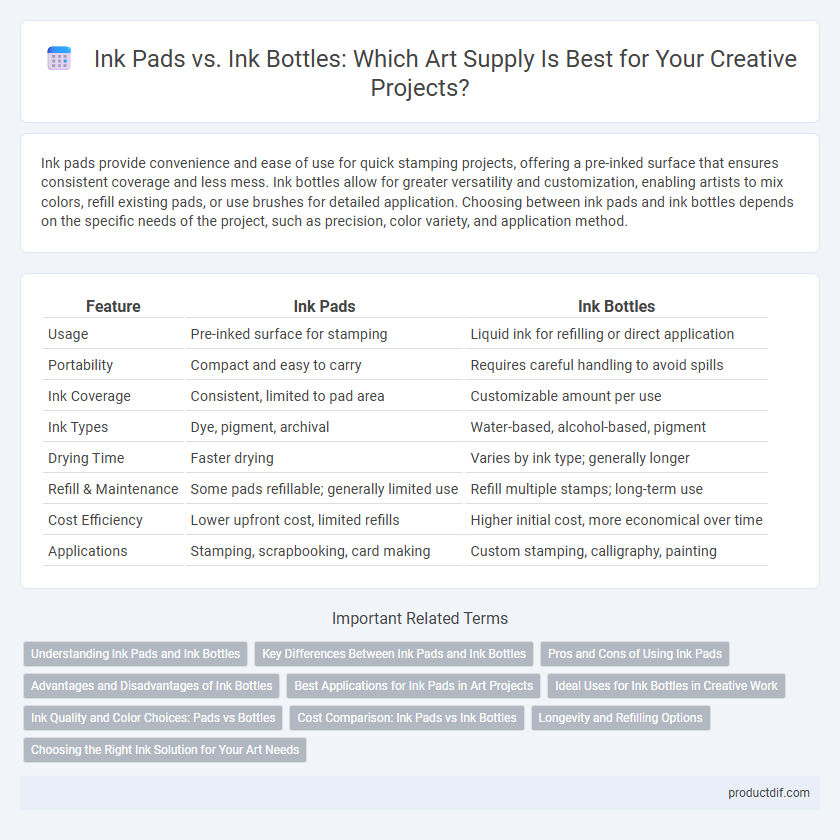Ink pads provide convenience and ease of use for quick stamping projects, offering a pre-inked surface that ensures consistent coverage and less mess. Ink bottles allow for greater versatility and customization, enabling artists to mix colors, refill existing pads, or use brushes for detailed application. Choosing between ink pads and ink bottles depends on the specific needs of the project, such as precision, color variety, and application method.
Table of Comparison
| Feature | Ink Pads | Ink Bottles |
|---|---|---|
| Usage | Pre-inked surface for stamping | Liquid ink for refilling or direct application |
| Portability | Compact and easy to carry | Requires careful handling to avoid spills |
| Ink Coverage | Consistent, limited to pad area | Customizable amount per use |
| Ink Types | Dye, pigment, archival | Water-based, alcohol-based, pigment |
| Drying Time | Faster drying | Varies by ink type; generally longer |
| Refill & Maintenance | Some pads refillable; generally limited use | Refill multiple stamps; long-term use |
| Cost Efficiency | Lower upfront cost, limited refills | Higher initial cost, more economical over time |
| Applications | Stamping, scrapbooking, card making | Custom stamping, calligraphy, painting |
Understanding Ink Pads and Ink Bottles
Ink pads provide a pre-inked surface ideal for quick stamping and consistent application, commonly used in crafting and office work. Ink bottles contain liquid ink to refill pads or directly apply with brushes or pens, offering versatility in color mixing and depth. Choosing between ink pads and bottles depends on the project's precision needs, reusability, and desired ink intensity.
Key Differences Between Ink Pads and Ink Bottles
Ink pads provide pre-inked surfaces ideal for quick stamping, while ink bottles contain liquid ink used to refill pads or for direct application with brushes and pens. Ink pads offer consistent ink distribution and are convenient for repetitive stamping, whereas ink bottles offer greater versatility in color mixing and intensity control. Choosing between ink pads and bottles depends on the project requirements, including ease of use, precision, and color customization.
Pros and Cons of Using Ink Pads
Ink pads offer convenience and ease of use with pre-saturated surfaces that provide consistent ink distribution, ideal for stamping and quick projects. However, they can dry out over time, limiting longevity, and may contain less ink variety compared to bottles, which provide customizable saturation and color mixing options. Ink pads are excellent for repetitive stamping but less suited for detailed or large-scale ink application where bottles allow more control.
Advantages and Disadvantages of Ink Bottles
Ink bottles offer greater versatility and cost-efficiency for artists requiring large quantities of ink or custom mixing options, enabling control over ink consistency and color blending. They can be less convenient than ink pads due to potential messiness and the need for additional tools such as brushes or stampers for application. However, ink bottles are ideal for projects demanding varied techniques or refillable use, despite the slower drying time compared to pre-inked pads.
Best Applications for Ink Pads in Art Projects
Ink pads are ideal for detailed stamping projects, card making, and scrapbooking due to their ease of use and consistent ink distribution. Their compact design allows for precise application on paper, fabric, and other porous surfaces, making them perfect for creating crisp, repeatable patterns and textures. Ink pads offer quick drying times and minimal mess, enhancing efficiency in mixed media and journaling art techniques.
Ideal Uses for Ink Bottles in Creative Work
Ink bottles are ideal for artists and crafters who require versatility and control in their creative projects, allowing precise ink dilution and mixing for custom colors. They provide a cost-effective option for frequent use, especially in calligraphy, stamping, and detailed painting where consistent ink flow is essential. Unlike ink pads, bottles facilitate refilling tools and creating washes, enhancing artistic flexibility and experimentation.
Ink Quality and Color Choices: Pads vs Bottles
Ink pads offer consistent, pre-saturated ink that ensures uniform application and ease of use, ideal for stamping and quick projects. Ink bottles provide greater flexibility with customizable saturation levels and a broader range of vibrant colors, allowing artists to mix and achieve precise hues. Both ink pads and bottles vary in pigment quality, but bottles typically contain higher-concentration inks suited for detailed, long-lasting artwork.
Cost Comparison: Ink Pads vs Ink Bottles
Ink pads generally have a higher upfront cost compared to ink bottles but offer consistent, ready-to-use ink for stamping projects. Ink bottles provide more ink volume at a lower price per milliliter, making them cost-effective for frequent or large-scale use. When considering long-term expenses, ink bottles minimize replacement frequency, but ink pads reduce mess and waste, balancing cost efficiency with convenience.
Longevity and Refilling Options
Ink pads offer extended longevity as their saturated surface controls ink depletion, making them ideal for repeated stamping tasks. Ink bottles provide versatile refilling options, allowing users to replenish ink pads or customize ink colors, enhancing sustainability and reducing waste. Choosing between ink pads and ink bottles depends on the balance between immediate usability and long-term maintenance flexibility in art supply workflows.
Choosing the Right Ink Solution for Your Art Needs
Ink pads offer convenience and clean application for stamping and quick projects, making them ideal for crafters seeking efficiency and portability. Ink bottles provide versatility with refillable options, allowing artists to customize ink saturation and mix colors, which suits detailed and large-scale artwork. Selecting between ink pads and bottles depends on your art technique, desired control, and project scale to optimize your creative process.
Ink pads vs Ink bottles Infographic

 productdif.com
productdif.com